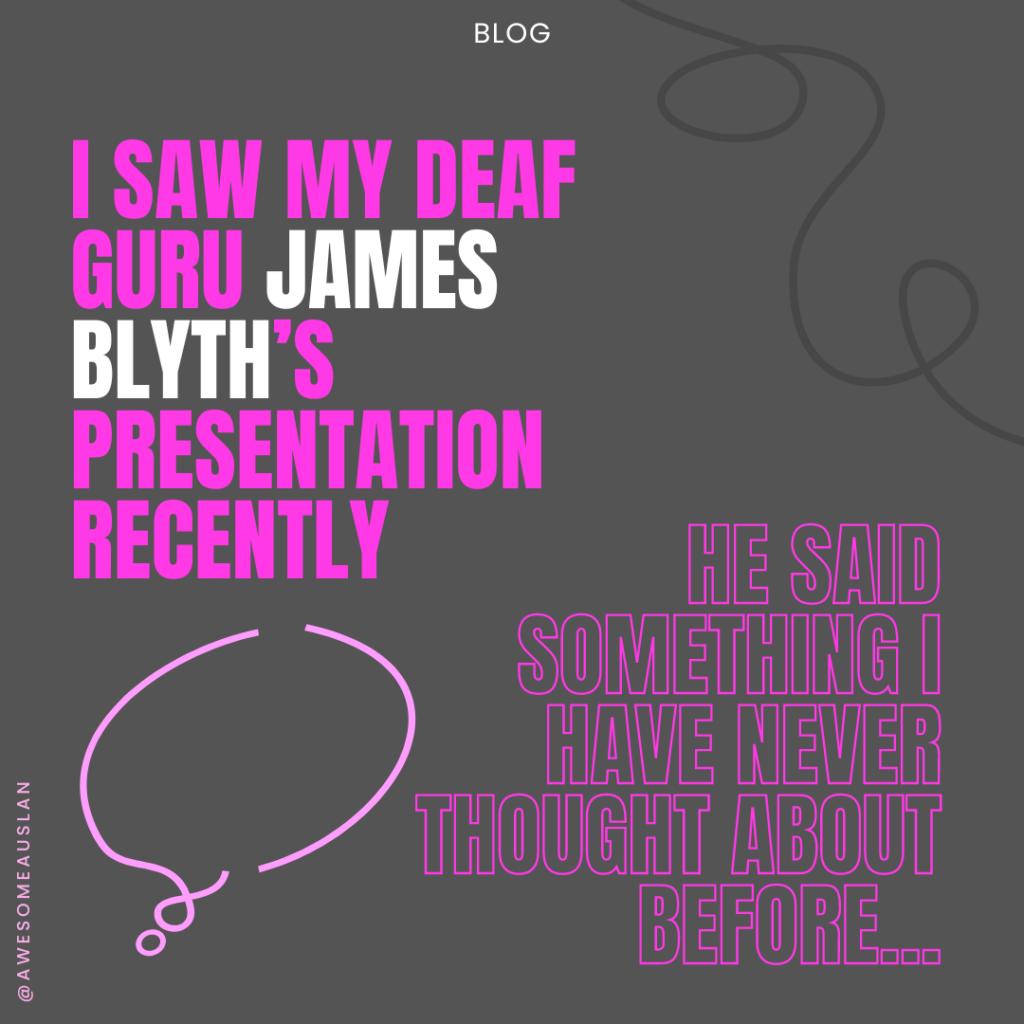You may notice that there’s an almost fierce protectiveness over our language by some of our Deaf community members.
There are a few very valid reasons for this. Historically, the Deaf community has had to fight not only for recognition of and ‘permission’ to use our language, but also fight to even be seen as cognizant, intelligent and conversationally aware beings.
Throughout history, hearing people have decided that Deaf who couldn’t talk/verbally speak, were dumb, evil, and incapable of intelligence. Because of some of these societal beliefs reinforced by prejudicial systems, Deaf people were deemed unable to procreate – even enforcing this through eugenics – and unable to receive family inheritances, disallowed from marrying etc.
There was also a generally held belief that spoken language was superior to sign language; that sign language was a series of gestures and not an actual language in its own right.
I saw my (Deaf) guru, James Blyth*, present at a workshop recently. He said something I have never thought about before. It really impacted me.
He was talking about the importance and necessity of Auslan being taught properly, correctly, and well.
Unlike other language teachers in Australian schools, if a German LOTE teacher doesn’t teach the German language well, there’s a whole country where everyone speaks, uses, preserves and protects the authenticity of the language so those people who go to Germany and speak the language incorrectly are not going to have a huge impact on the language.
Same for Japanese teachers, if their students don’t learn the language well, well, there’s millions of people who speak the language, so the students who mispronounce and incorrectly speak and use the language will not compromise or jeopardise the language.
However, considering that 95% of deaf people are born to hearing families and less than 10% of those families bother to learn sign language, it is not an uncommon story that many d/Deaf people learn/seek out Deaf community and language later in life. I sought it out when I was 16 years old. It’s frankly exhausting to always keep trying to fit into a hearing world which often makes so few allowances for the Deaf community.
When I was a high school Auslan language teacher, some Year 6 classes came to visit at the end of the school year. These were students who had learnt A LITTLE Auslan that year and planned to go on to continue to learn more Auslan once they arrived in high school the following year.
As I stood out the front of the class and went over some basic signs, including the Auslan alphabet, I noticed some incorrect productions of letters/signs. When I gently reminded/corrected a particular student, their belligerent response was, “That’s what my teacher taught me!”
They weren’t interested in being corrected or knowing the correct formation of the letter/sign. This experience alarmed and horrified me as I personally knew that their teacher was hearing and still in the process of learning Auslan themselves.
As a member of the Deaf community and a Deaf teacher and Auslan user, I would hope that any hearing teachers who teach Auslan are reminding their students that listening to and respecting Deaf/users of Auslan when and where appropriate, above what their inexperienced/non-native LOTE teachers might teach.
At the very least, educators should be reminding their students that daily users of the language naturally have greater insight into the use of the language than someone who merely teaches it and isn’t involved in the community of that language.
If an Auslan teacher is teaching incorrect sign formation and their students learn and use these incorrect signs, they will most likely go on to use these in our fragmented Deaf community. Because remember, there isn’t a country called ‘Ausland’ ({sic} & pun intended) with a homogenous community of users to preserve and protect this language. Therefore, there is a very real and disturbing possibility that many incorrect signs can and will be spread throughout our community in this way.
And this was James Blyth’s point: where other languages have thousands, even millions, of users of their language and often have a country with the origin of said language, Auslan does not.
In light of this, the preservation of our language becomes a solemn undertaking and one not to be taken lightly.
Teachers of Auslan in particular (and users of Auslan in general) should make it a point to ensure they are confident about the citation form and therefore the parameters of each sign they use, as this is vitally important to correct use and production of Auslan signs.
This, in turn, ensures – or at least works towards – the preservation of this awesome language.
Hope you found this handy and keep up your Awesome Auslan!
*James Blyth is the founder of Auslan Consultancy.
Disclaimer This information is entirely subjective and based on my personal experience, interpretation and understanding of the subject matter.

As a Deaf person who has used, loved, and continued to learn Auslan throughout my life, it was when I started studying the Diploma of Auslan (Deaf cohort 2018) that I was awestruck by how beautifully complex Auslan is.

